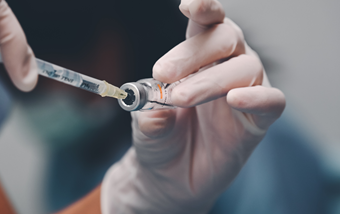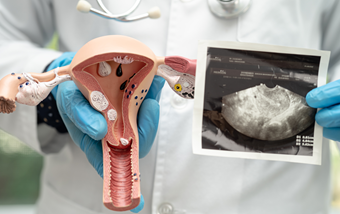But what about those who have been able to have a child or children in the past, but are now unable to conceive naturally? This is called secondary infertility; the inability to get pregnant or to sustain a full-term pregnancy after giving birth to a child naturally. It is an issue that affects approximately 5% of the population, and is something that can come as a huge surprise to those who experience it.
What are the causes of primary and secondary infertility?
Primary infertility shares many of the same causes of secondary infertility, and both male and female factors play an equal role. In men, this typically means problems with sperm count, low sperm quality and/or blockages that prevent the delivery of sperm. In women it can be down to a range of conditions such as endometriosis or fibroids that affect their reproductive organs, or polycystic ovary syndrome (PCOS) which can affect regular ovulation. It could also be down to damaged or blocked fallopian tubes.
In both men and women, age plays a significant role. Female fertility peaks at age 25 and drops after the age of 35. Men, like women, also have a biological clock which means that their fertility can decline from the age of 40.
As well as this, excessive weight gain or weight loss can affect fertility, causing hormone imbalance, contributing to irregular periods and ovulation difficulties. Weight problems can also affect fertility in men.
One cause of secondary infertility that distinguishes it from primary infertility is the potential complications of previous pregnancies or deliveries, for example in the case of a caesarean section.
What are the treatment options for primary and secondary infertility?
The treatment options available for primary and secondary infertility are largely the same. In the case of secondary infertility, however, initial treatment may be more mild, due to previous success in becoming pregnant. This could range from addressing lifestyle factors to ovulation induction.
For both primary and secondary infertility, treatment could involve minor surgery, such as removal of a fibroid or polyp in the uterus or addressing medical or surgical causes of male infertility, or in the form of assisted conception, including intrauterine insemination (IUI) and in vitro fertilisation (IVF). The introduction of counselling can also be helpful.
What sets secondary infertility apart from primary infertility?
Although the causes and treatments for primary and secondary infertility are more or less the same, the circumstances and emotional experience can differ.
On top of the general emotions associated with any form of infertility, patients with secondary infertility can feel guilty for wanting more children, scared they will be assumed as ungrateful for the child they already have (which is of course not the case). Many parents and couples have an image of their ‘ideal family’ in their mind before embarking on their parenting journey, so when faced with the prospect of being unable to achieve this, it can be devastating.
Coupled with this emotional toll is the financial dilemma: typically, those couples who have no children have a greater chance of accessing NHS funding for IVF treatment over those who have already have a child (even if from a previous relationship). This can mean that many patients experiencing secondary infertility are excluded from NHS funded treatment.
Although a handful of Clinical Commissioning Groups will offer IVF on the NHS if one partner has a child from a previous relationship, this is not standard practice within England. And nowhere offers IVF on the NHS for couples wanting a second child. For some, a lack of NHS funding for IVF can mean an end to their dream of having a much-wanted family.
At abc ivf, we want to provide the highest quality treatment at an affordable cost to everyone, regardless of their circumstances. So, if you are struggling with primary or secondary infertility and sadly aren’t able to access NHS funded treatment, but can’t afford the hefty price tag that often comes with high-cost private IVF treatment, take the first step and book your Advanced Ultrasound Scan & Virtual Consultation today.



